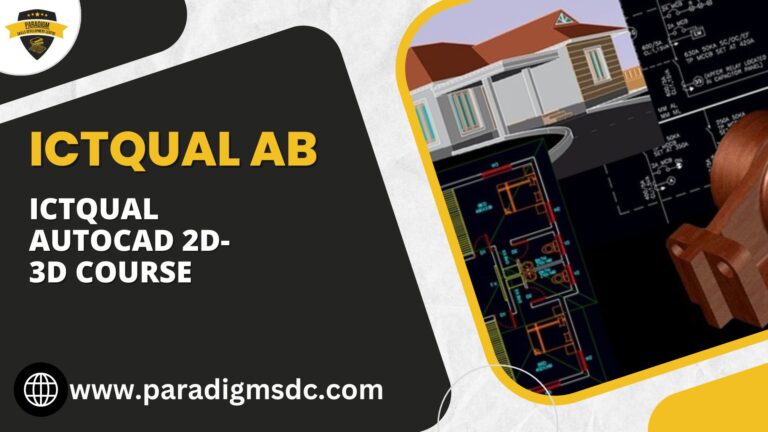If you’re aspiring to advance your career in civil engineering, the ICTQual Level 4 Diploma in Civil Engineering offers an excellent opportunity. With 120 credits earned in just one year, this program can be completed in as little as three months, providing a fast track to professional qualifications.
The ICTQual Level 4 Diploma in Civil Engineering is a comprehensive qualification designed to equip learners with the technical knowledge and skills necessary for a successful career in civil engineering. The course covers key areas such as structural analysis, materials science, surveying, and construction management, all of which are essential for those looking to work in engineering roles across various sectors.
The diploma offers a balanced curriculum that includes both theoretical knowledge and practical skills. Topics covered include civil engineering principles, project management, design, environmental considerations, and construction safety. The program is designed to ensure that students are well-prepared for real-world challenges.
Completing the ICTQual Level 4 Diploma opens up a wide range of career opportunities in civil engineering. Graduates are well-equipped to pursue roles in project management, design, surveying, construction, and even further academic study.
The ICTQual Level 4 Diploma in Civil Engineering is ideal for individuals who want to start or advance their careers in civil engineering. It’s perfect for those with a technical background who are looking to gain specialized knowledge and industry-recognized qualifications. The fast-track nature of the course also makes it a great option for working professionals who want to enhance their qualifications without taking too much time off.
The ICTQual Level 4 Diploma in Civil Engineering offers a fast, flexible, and comprehensive way to gain the qualifications necessary to thrive in the civil engineering industry. With the ability to complete the program in as little as three months, this qualification allows you to accelerate your career and gain valuable skills in a short time. If you’re ready to take the next step in your civil engineering career, this diploma could be your gateway to success.
Study Units
- Introduction to Civil Engineering
- Materials Science and Engineering
- Surveying Techniques and Equipment
- Structural Analysis and Design
- Geotechnical Engineering
- Construction Technology and Methods
- Environmental and Sustainability Issues in Civil Engineering
- Project Management in Civil Engineering
- Construction Safety and Risk Management
- Hydraulics and Water Engineering
- Transportation Engineering and Planning
- Civil Engineering Design Project
Learning Outcomes
Below are the learning outcomes for each of the study units in the ICTQual Level 4 Diploma in Civil Engineering program:
1. Introduction to Civil Engineering
- Understand the role of civil engineering in society and the various sectors within the industry.
- Identify key career opportunities and the skills required to succeed in civil engineering.
- Recognize the history and evolution of civil engineering practices.
2. Materials Science and Engineering
- Analyze the properties of construction materials such as concrete, steel, and composites.
- Evaluate the suitability of materials for different types of civil engineering projects.
- Apply knowledge of material testing methods to ensure durability and strength in construction.
3. Surveying Techniques and Equipment
- Demonstrate proficiency in using surveying equipment and techniques for measuring distances, angles, and elevations.
- Interpret and apply surveying data for civil engineering projects.
- Understand modern advancements in surveying technologies and their impact on construction accuracy.
4. Structural Analysis and Design
- Analyze forces, moments, and load distributions in various structures.
- Design simple structural elements such as beams, columns, and foundations using appropriate engineering methods.
- Apply structural design codes and standards to ensure safety and stability.
5. Geotechnical Engineering
- Understand soil mechanics and the behavior of soil and rock in engineering contexts.
- Conduct soil tests and interpret results for foundation design.
- Apply geotechnical principles to assess ground conditions for construction projects.
6. Construction Technology and Methods
- Identify and apply modern construction techniques and technologies in civil engineering.
- Understand the construction process, from excavation and site preparation to finishing.
- Evaluate the use of prefabrication, modular construction, and other innovative methods in the industry.
7. Environmental and Sustainability Issues in Civil Engineering
- Evaluate the environmental impact of civil engineering projects and propose sustainable alternatives.
- Apply green building practices and eco-friendly materials in design and construction.
- Understand the principles of waste management and energy efficiency in civil engineering projects.
8. Project Management in Civil Engineering
- Plan, organize, and manage civil engineering projects, including budgeting, scheduling, and resource allocation.
- Apply project management tools and techniques to control costs, timelines, and quality.
- Understand the roles and responsibilities of project managers in large-scale civil engineering projects.
9. Construction Safety and Risk Management
- Recognize safety hazards in construction environments and apply safety regulations and protocols.
- Conduct risk assessments to identify and mitigate potential dangers on construction sites.
- Understand the importance of health and safety management systems in maintaining a safe working environment.
10. Hydraulics and Water Engineering
- Apply principles of fluid mechanics to design water supply and drainage systems.
- Analyze the behavior of fluids in engineering contexts, including flow rates and pressure.
- Design and evaluate flood control measures and water treatment systems.
11. Transportation Engineering and Planning
- Understand the principles of designing and planning transportation infrastructure such as roads, railways, and airports.
- Analyze traffic flow and apply transportation planning concepts to improve efficiency and safety.
- Evaluate the environmental and social impacts of transportation projects on communities and ecosystems.
12. Civil Engineering Design Project
- Integrate knowledge from various areas of civil engineering to design a practical civil engineering project.
- Apply engineering analysis, design principles, and project management techniques to develop a comprehensive project plan.
- Present and communicate the design process, including solutions to challenges encountered during the project.







